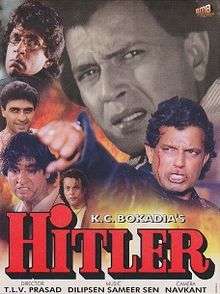Hitler (1998 film)
| Hitler | |
|---|---|
 DVD Cover | |
| Directed by | T. L. V. Prasad |
| Produced by | K. C. Bokadia |
| Starring |
Mithun Chakraborty Shilpa Shirodkar Dipti Bhatnagar Sadiya Siddiqui Mohnish Bahl Arun Bakshi Hemant Birje Mangal Dhillon Johnny Lever Raghuvaran |
| Music by | Dilip Sen-Sameer Sen |
| Cinematography | Navkant |
| Edited by |
Shyam Mukherjee, DN Malik |
Production company |
BMB Productions |
Release date | 15 May 1998 |
Running time | 137 min. |
| Country | India |
| Language | Hindi |
| Budget | ₹ 2,25,00,000 |
| Box office | ₹ 1,94,00,000 (Flop) |
Hitler is a 1998 Hindi language Indian film directed by T. L. V. Prasad, starring Mithun Chakraborty, Shilpa Shirodkar, Dipti Bhatnagar, Sadiya Siddiqui, Mohnish Bahl, Arun Bakshi, Hemant Birje, Mangal Dhillon, Johnny Lever and Raghuvaran.
Plot
Siddhant Sharma (Mithun Chakraborty), a senior prison official, is widely known as "Hitler" because of his rigid disciplinarian manner. At the prison he foils the planned escape of a gangster, arranged by his gang. He beats and then sacks a corrupt prison officer who was in on it.
At home Siddhant is equally authoritarian. His family are only able to relax when he is away at work. He is especially hard on his wayward brother Amar, who is unwilling to get a job and hangs around in the street.
In the street Amar sees a young woman, Priya, apparently being kidnapped. He rescues her from her comically incompetent attackers, only to discover that she had arranged it herself in order to get money from her father, a corrupt businessman. Priya and Amar fall in love. Meanwhile, gangsters try to bribe Siddhant into allowing the escape of the prisoner, but he will have none of it.
Daulatram, Priya's father, confronts Siddhant and accuses him of instructing Amar to woo Priya, so that the Sharma family can inherit his wealth. When Siddhant asks Amar to explain himself, Amar tells him that he and Priya are in love. Furious at Daulatram for embarrassing his brother, Amar confronts him threateningly, brandishing a knife in front of witnesses. The leader of gangsters, who is in conflict with Daulatram, sees what is happening. He takes the opportunity to kill Daulatram and frame Amar to get back at Siddhant. Unknown to him, the phone has been left off the hook during a call to the police, leaving a taped recording of events on an answering machine at the police station.
After Daulatram is found stabbed to death, the police arrest Amar. Siddhant is convinced of his guilt, but his wife Sheila, a lawyer, refuses to believe it. She intends to defend Amar and discover the truth about Daulatram's murder. While she is investigating, she is injured in a road accident. When Amar learns of this, he escapes from the prison, pursued by his brother. He finds the gangsters, grabbing the sacked prison guard, but Siddhant has followed him. Siddhant shoots Amar, wounding him.
Siddhant is in anguish, but the tape recording is found by the police, exonerating Amar. Siddhant arrests the gangster leader. However, the gangsters make a doctored version of the tape, rearranging the conversation to implicate Amar. The gangster boss is released. He manages to capture Amar and Priya. When Siddhant comes to negotiate, the gangster reveals that Siddhant's whole family have been kidnapped and wired to explosives. He forces Siddhant and Amar to try to kill each other in a fight to the death. Siddhant allows himself to be apparently beaten, but in an athletic leap he grabs the detonator from the gangster leader. Siddhant and Amar fight and defeat the gangsters, who are taken into custody.
Back at home with his family, Siddhant leaves behind his "Hitler" persona, and learns to relax, dancing to Michael Jackson's "Bad".
Cast
- Mithun Chakraborty as Jailor Siddhant Kumar Sharma
- Shilpa Shirodkar as Advocate Sheila S. Sharma
- Raghuvaran as gangster boss
- Dipti Bhatnagar
- Sadiya Siddiqui as Priya
- Mohnish Bahl as Monty Bhalla
- Arun Bakshi as Inspector Bakshi
- Hemant Birje as Vicky
- Vikas Anand as IPS Officer
- Anil Dhawan as Kishorilal
- Mangal Dhillon as Dy. Jailor Sewak
- Satyendra Kapoor as Daulatram
- Johnny Lever as O Men
- Manek Bedi as Amar
Music
- "Jhumri Talaiya Se Pahoonchi Nainitaal Main" - Sapna Awasthi
- "Main Tera Murga Tu Meri Murgi" - Abhijeet, Alka Yagnik
- "Gaalon Se Kheloon Main" - Kumar Sanu, Kavita Krishnamurthy
- "Hasi Samaa Hai" - Abhijeet, Asha Bhosle
- "O Meri Chudi Khanak Uthi Raat Mein" - Udit Narayan, Alka Yagnik
- "Dil Tujhe Dungi" - Udit Narayan, Sadhana Sargam